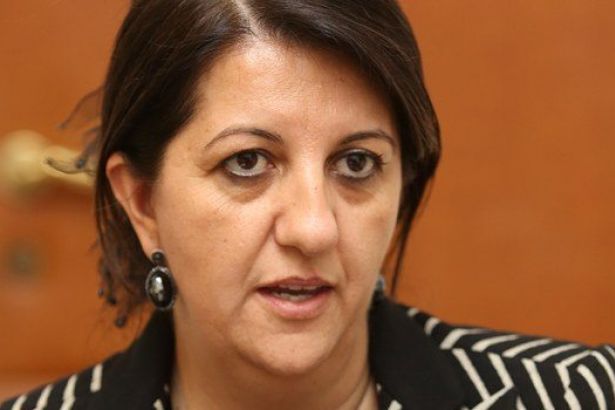HDP offers 'anti-AKP' block while leaving door open to Turkey's ruling party

Pro-Kurdish Peoples' Democratic Party co-leader Pervin Buldan has called on to form an alliance for the elections in 2019 against the block of the ruling Justice and Development Party (AKP) and the fascist Nationalist Movement Party (MHP).
However, Buldan had left the door open to a possible alliance between HDP and the Turkish President Recep Tayyip Erdoğan's AKP party. "I cannot say anything about what will be in the future. The upcoming process will primarily focus on the removal of blocked political channels," she had told Sputnik Radio.
HDP's new co-chiefs have also given the green light recently to a new "solution process" between their party and AKP.
"A DEMOCRACY FRONT SHOULD BE FORMED"
Talking to Cumhuriyet daily on Febr. 28, Buldan indicated to a 'no' front, implying those political structures and citizens who voted against the critical constitutional referendum in April 2017.
"I think that it will be meaningful if the 'no' front vigorously comes together and carries out a joint action. Leaving aside the political parties, the 'no' front should unite. A democracy front should be formed and jointly act against the AKP/MHP alliance," Buldan said.
The AKP government and the fascist MHP party launched a 'yes' campaign in favour of the critical constitutional amendments that would abolish the existing prime ministry office and the parliamentary system which would be replaced with an executive presidential mechanism so as to further strengthen Erdoğan's grip on power.
Asked about her party's opinion as some AKP administrators argued that the CHP and HDP parties should form an alliance, Buldan said, "As the HDP, we say that an alliance with democratic forces would be meaningful. We are always ready for an alliance with such forces in favour of peace, democracy and liberties. In this respect, our door is open to everybody as long as an agreement could be established on some principles."
General elections are scheduled to be held in Turkey on 3 November 2019 to elect both the President and Grand National Assembly.
MANY POLITICAL PARTIES AND GROUPS SAID 'NO' WITH DIFFERENT MOTIVES
Although the HDP co-chief portrays a wide 'no' front, the CHP, the HDP party, inner-party factions within the fascist MHP party which later founded the ultra-nationalist 'Good Party', the Islamist Felicity Party, the Liberal Democratic Party and many other right-wing, liberal and nationalistic parties said 'no' with different motives during the referendum.
Apart from the 'yes' campaign, many political parties and groups held an individual 'no' campaign. In other words, many political entities within the wide spectrum from Left to Right did not form a 'no' front but raised their 'no' voices separately.
"SOMETHING NON-EXISTENT CANNOT BE DIVIDED"
Kemal Okuyan, the General Secretary of the Communist Party of Turkey (TKP), wrote an article on February 20, 2017, ahead of the referendum. "We are facing a well-known front on the road to the referendum: the front of 'yes.' (...) As far as those who say 'no' are concerned, we cannot speak of such coalescence at all," Okuyan said.
"Everybody should stick to their own guns! No one should dare to raise their voice and say, 'It would be needless to divide the no front'. Something non-existent cannot be divided. When a harsh and bloody settlement came to the fore within the coalition of AKP on July 15, we were not those who invented the spirit of Yenikapı to help Erdoğan instead of taking an honourable road against the pro-American reactionary Gülenist movement," he underlined.
SIGNALS FOR NEW 'SOLUTION PROCESS'
In an interview with Reuters news agency on February 14, Pervin Buldan said she wants to revive a 'solution process' that collapsed three years ago, what she calls "a turning point for Turkey".
Buldan was a key figure in the so-called 'solution process' between Erdoğan's AKP government and PKK, HDP in 2009 and 2015, as a part of the delegation that carried out meetings with PKK leader Abdullah Öcalan.
Leaving the door open to a new "solution process", another HDP co-chair Sezai Temelli said: "If we are to mention a solution process today, we need to create a more realistic, permanent and sound mechanism of a solution by taking account of new dynamics in light of all these information. We need to take steps for the solution."
Temelli is criticized for his participation in the "Not enough, but yes!" campaign which catalysed the AKP-Gülen network-liberal trio alliance's win over the critical constitutional referendum in September 2010.
The former co-chair of the HDP Selahattin Demirtaş spoke to a court on February 15 and stated that "the Turkish AKP government tried to pressure us via Abdullah Öcalan, in order to obtain more 'yes' votes in the [constitutional vote in 2010] referendum". The pro-Kurdish party and the militant PKK called for a boycott instead of a 'no' vote, saying that the proposed constitutional reforms did not meet the Kurdish need for a brand new constitution.




